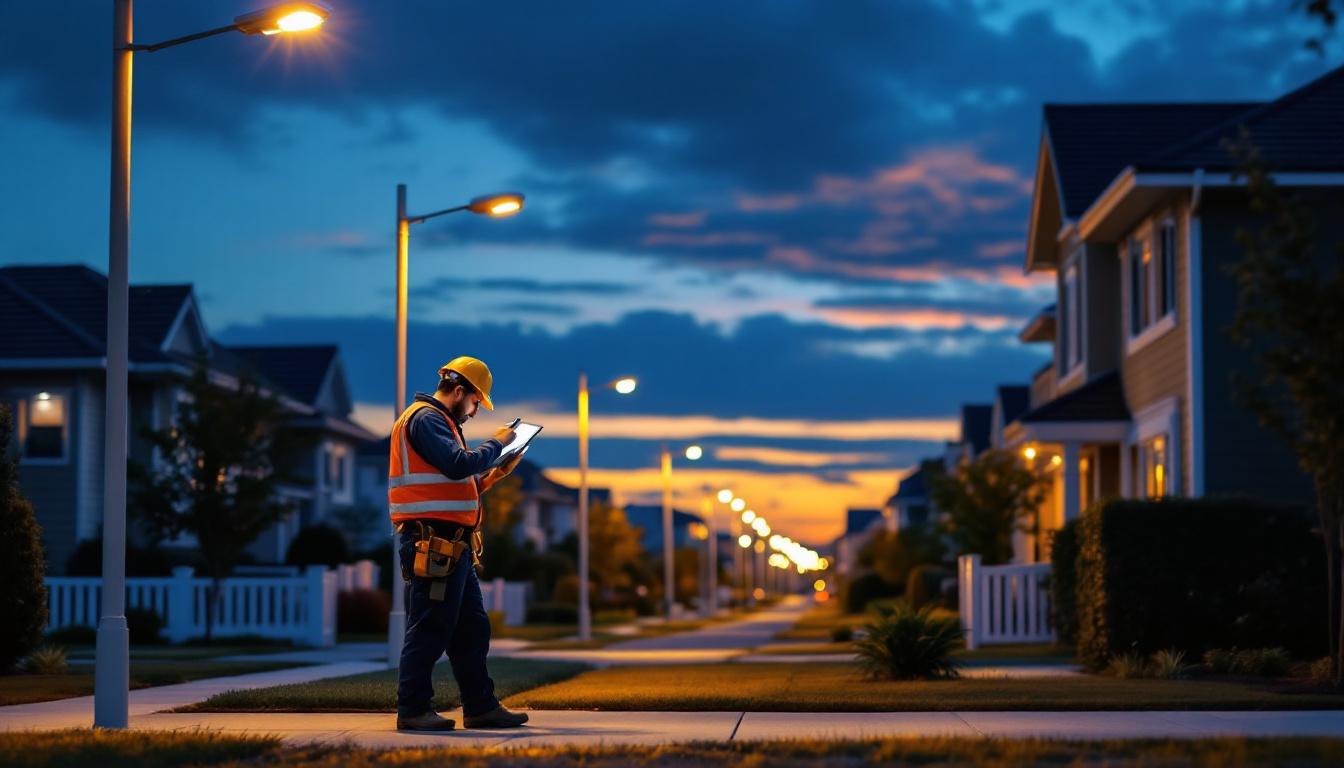
Residential street lighting plays a pivotal role in enhancing the safety, security, and aesthetic appeal of neighborhoods. For lighting contractors, understanding the intricacies of residential street lights can significantly improve project efficiency and client satisfaction. This article delves into the various aspects of residential street lights and how they contribute to the efficiency of lighting contractors.
Residential street lights are essential fixtures that illuminate public roads and pathways in residential areas. These lights not only aid in visibility but also enhance the overall ambiance of the neighborhood. With advancements in technology, the design and functionality of street lights have evolved, leading to improved energy efficiency and reduced maintenance costs. The aesthetic appeal of street lighting also plays a crucial role in creating a welcoming environment, often serving as a focal point in community design and urban planning.
There are several types of residential street lights available, each designed to serve specific purposes. Traditional incandescent and fluorescent lights have largely been replaced by more energy-efficient options like LED and solar-powered lights. LED street lights, for instance, offer longer lifespans and lower energy consumption, making them a preferred choice for many contractors. These lights also provide a clearer, whiter light that enhances visibility for drivers and pedestrians alike, contributing to overall safety in residential areas.
Solar-powered street lights, on the other hand, harness solar energy during the day and illuminate the streets at night without relying on the grid. This not only reduces energy costs but also provides a sustainable lighting solution, appealing to environmentally conscious clients. In addition, many solar lights come equipped with motion sensors that increase brightness when movement is detected, further enhancing safety while conserving energy during quiet hours.
The transition to modern street lighting systems brings numerous benefits. Firstly, energy efficiency is a significant advantage, as modern lights consume less power while providing superior illumination. This translates to lower electricity bills for municipalities and homeowners alike. Furthermore, the reduced carbon footprint associated with these energy-efficient lights aligns with global efforts to combat climate change, making them a responsible choice for communities aiming for sustainability.
Moreover, modern street lights often feature smart technology, allowing for remote monitoring and control. This capability enables lighting contractors to manage lighting systems more effectively, ensuring timely maintenance and reducing downtime. Smart street lighting can also integrate with other urban infrastructure, such as traffic management systems, to optimize energy use and improve traffic flow. As cities evolve, the ability to adapt street lighting to meet the dynamic needs of the community becomes increasingly important, fostering a safer and more connected environment for all residents.
For lighting contractors, the adoption of modern residential street lighting systems can lead to substantial improvements in operational efficiency. By understanding the advantages of these systems, contractors can streamline their processes and enhance service delivery.
Modern street lights are designed with ease of installation in mind. Many manufacturers provide comprehensive installation guides and pre-assembled components, which can significantly reduce the time and labor required for setup. This efficiency not only shortens project timelines but also allows contractors to take on more projects simultaneously.
Additionally, the lightweight design of many contemporary street lights makes transportation and handling easier, further contributing to a more efficient installation process. Contractors can minimize delays and ensure that projects are completed on schedule, leading to increased client satisfaction. Furthermore, the integration of modular components allows for quick replacements and upgrades, enabling contractors to adapt to evolving technologies without extensive downtime. This adaptability is crucial in a fast-paced industry where staying ahead of the competition is key.
One of the most significant advantages of modern street lighting is the reduction in maintenance and operational costs. LED lights, for instance, have a lifespan of up to 25,000 hours or more, compared to traditional lights that may require replacement every few thousand hours. This longevity means fewer replacements and less frequent maintenance visits, allowing contractors to allocate resources more effectively.
Moreover, smart lighting solutions equipped with sensors can automatically adjust brightness levels based on ambient light conditions, further optimizing energy use and extending the lifespan of the fixtures. This feature not only enhances efficiency but also appeals to clients looking for sustainable solutions. The incorporation of remote monitoring systems allows contractors to receive real-time data on the performance of lighting installations, enabling proactive maintenance and reducing the likelihood of unexpected failures. By leveraging these advanced technologies, contractors can enhance their service offerings and build stronger relationships with clients who value reliability and innovation.
In the competitive world of lighting contracting, building strong relationships with clients is crucial. By offering modern residential street lighting solutions, contractors can significantly enhance their appeal to potential clients.
Clients today are increasingly aware of the benefits of energy-efficient and sustainable lighting solutions. By providing options such as LED and solar-powered street lights, contractors can meet and exceed client expectations. This proactive approach demonstrates a commitment to quality and innovation, which can lead to repeat business and referrals.
Furthermore, educating clients about the long-term benefits of modern street lighting can foster trust and confidence in the contractor’s expertise. Providing detailed information on energy savings, maintenance schedules, and environmental impact can position the contractor as a knowledgeable partner in the project.
Every residential area has its unique lighting needs based on factors such as layout, foot traffic, and local regulations. By offering customized lighting solutions, contractors can address these specific requirements effectively. This tailored approach not only enhances the functionality of the lighting system but also ensures that clients feel valued and understood.
Contractors can collaborate closely with clients to design lighting plans that align with their vision while ensuring compliance with relevant standards. This level of personalized service can set a contractor apart from competitors and solidify their reputation in the industry.
The lighting industry is witnessing rapid technological advancements that are reshaping the landscape of residential street lighting. Staying updated on these innovations is essential for lighting contractors aiming to improve efficiency and service quality.
Smart lighting systems incorporate advanced technologies such as IoT (Internet of Things) connectivity, allowing for real-time monitoring and management of street lights. These systems can provide valuable data on energy consumption, maintenance needs, and usage patterns, enabling contractors to optimize their operations.
With smart lighting, contractors can also implement features such as adaptive lighting, which adjusts brightness based on environmental conditions or time of day. This not only enhances energy efficiency but also improves safety by ensuring adequate illumination when needed.
The integration of renewable energy sources, particularly solar power, is becoming increasingly popular in residential street lighting projects. Contractors can offer clients sustainable solutions that reduce reliance on traditional power grids and lower overall energy costs.
Solar-powered street lights can be installed in areas where extending electrical infrastructure may be challenging or costly. This flexibility allows contractors to expand their service offerings and cater to a broader range of clients, from residential neighborhoods to parks and recreational areas.
Examining successful case studies can provide valuable insights into the effective implementation of residential street lighting projects. These examples highlight the benefits of modern lighting solutions and the positive impact on communities.
In several urban areas, community revitalization projects have successfully integrated modern street lighting to enhance safety and aesthetics. By replacing outdated lighting with energy-efficient LED fixtures, neighborhoods have experienced a significant reduction in crime rates and an increase in foot traffic.
These projects often involve collaboration between local governments, lighting contractors, and community organizations. By working together, stakeholders can create well-lit environments that foster a sense of community and encourage outdoor activities, ultimately improving the quality of life for residents.
Many municipalities have launched energy savings initiatives aimed at reducing overall energy consumption. By retrofitting existing street lights with LED technology, these initiatives have resulted in substantial cost savings and decreased carbon footprints.
Contractors involved in these projects have reported increased demand for their services, as municipalities seek to modernize their lighting infrastructure. This trend underscores the importance of staying informed about energy-efficient solutions and the potential for contractors to expand their business in this growing market.
Residential street lighting is more than just a functional necessity; it is a vital component of community safety, aesthetics, and sustainability. For lighting contractors, embracing modern street lighting solutions can lead to improved efficiency, enhanced client relationships, and increased business opportunities.
By staying informed about technological advancements and understanding the unique needs of each project, contractors can position themselves as leaders in the industry. The shift towards energy-efficient and smart lighting systems is not just a trend; it is a fundamental change that will shape the future of residential street lighting.
Ultimately, investing in modern street lighting solutions is an investment in the future of communities and the success of lighting contractors. By prioritizing efficiency and sustainability, contractors can contribute to creating safer, more vibrant neighborhoods while also ensuring their own business growth.
Ready to elevate your lighting projects with the efficiency and sustainability of modern street lighting? At LumenWholesale, we provide lighting contractors like you with the highest quality, spec-grade lighting products at unbeatable wholesale prices. Say goodbye to local distributor markups and hello to a vast selection of reliable, high-performance lighting that meets the strictest industry standards. Plus, with free shipping on bulk orders, you can stock up on premium lighting solutions without worrying about hidden fees or compromises. Don’t miss out on the perfect blend of quality, affordability, and convenience. Take the next step towards brighter, safer, and more vibrant communities by visiting Wholesale Lighting at the Best Value today.

Discover how a chandeliers sale can transform your lighting projects by boosting efficiency and style.

Discover how under cabinet LED strip lighting is revolutionizing the projects of lighting contractors.

Illuminate your projects with expert insights on LED outdoor lights for homes.

Discover the advantages and drawbacks of using recessed LED lighting in your projects.